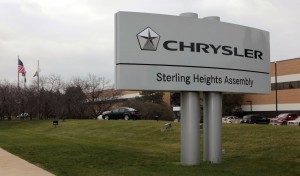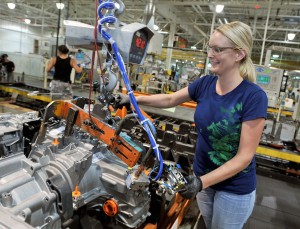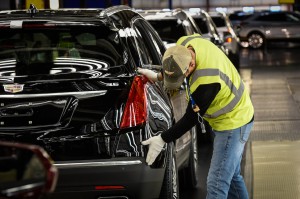
A Fiat Chrysler hourly employee managed to end up back at work on the assembly line in Michigan after testing positive for COVID-19.
This story has been updated with new information.
As armed protests at Michigan’s state capitol in Lansing calling for an end to stay-home orders capture attention around the world, auto workers are expressing serious apprehension about going back to work despite claims from automakers they have taken steps to make assembly lines safe.
The concern – and alarm – was underscored last week when a Fiat Chrysler worker at the company’s big assembly plant in Sterling Heights, Michigan, tested positive for the virus then returned to work on the line.
FCA later blamed the return on a missed communication but UAW officials said privately that the incident only underscored the ongoing concern workers have in going back to work in an environment where employees work shoulder to shoulder and often face to face within the six feet required for “social distancing.”
(Mexico ready to allow auto plants to reopen.)
Automakers insist they are aware of the hazards and changed the protocols aimed at protecting workers, who will be wearing masks, gloves and when necessary face shields.
Ford announced that they’ve contracted health-care providers in metro Detroit, Chicago, Kansas City and Louisville, Kentucky, to “quickly” test hourly and salaried workers at plants in those areas showing symptoms of COVID-19. The testing and results should be complete in 24 hours, officials noted. Employees in close proximity to those identified will be placed in a 14-day quarantine immediately.
By design, however, assembly lines are the industrial equivalent of densely packed urban neighborhoods where many people touch the same parts and the same tools in the same small areas in which the infection can quickly spread workers have noted.

Some Ford hourly workers have been skeptical of the company’s claim about cleaning plants during shutdown to make them safe for employees to return to work.
Even before, FCA, General Motors and Ford closed their assembly plants in mid-March before the death toll from COVID-19 began to mount, workers were balking at working on the line because of the quick-spreading virus.
There was at least one wildcat strike at an FCA plant, committeemen at a number of Ford plants filed tough grievances over working conditions while the chairman of a bargaining unit at a GM plant in Wyoming, Michigan was let go after he inquired about the possible presence of COVID-19 in the plant.
The UAW has filed a protest about the dismissal and vowed to get the UAW representative his job back, a union spokesman said. New social media posts about the dismissal of the UAW representative at the GM plant continue to circulate and the dismissed union representative, Travis Watkins, has developed a following among autoworkers.
Other comments on social media posted threads discussing the re-opening indicated workers were skeptical about the plans for re-opening plants. The virus also has opened old wounds about the old-fashioned blue-collar versus white-collar class divisions built into the industry’s culture.
(GM says no new COVID-19 cases, expects U.S. production back to normal in four weeks.)
“Not sure how other plants are doing it. But, at KCAP they are only running days for the first two weeks. The conspiracy side of my brain is thinking Ford is hoping to kill off some of us old heads,” noted one comment.
“This is going to be a shit show,” said another comment on the same thread.
“Problem is they don’t give a damn about us. The video Ford posted about while you’re out we are deep cleaning was bullshit! They sure as hell skipped Lima engine plant,” observed another post in the same thread.
UAW President Rory Gamble said on the eve of the resumption of production the UAW will continue to push automakers to implement safety protocols.
“We will continue to be vigilant in protecting the health and safety of our members, their families and their communities and we will continue to advocate for as much testing as possible and full testing as it becomes available,” Gamble said.
FCA, GM and Ford, which are losing billions of dollars while the plants are closed, are eager to resume production. Ford and GM executives acknowledged in in public forums last week that their second quarter losses are likely to exceed $2 billion each for the second quarter because of the loss of production during the shutdown.
(Ford getting ready for the post-pandemic chapter.)
GM, however, said it expects to have its plants operating at full speed within four weeks. FCA and Ford have been more circumspect, although it is still seems to be an open question whether they will pause for an annual vacation period in July.


Oh suck it up. Grocery store workers make less than half the money and have less protections with 100 times the risk.